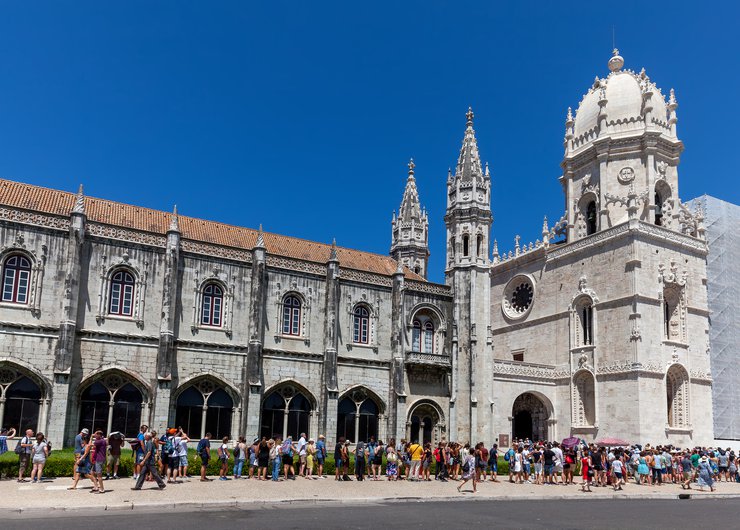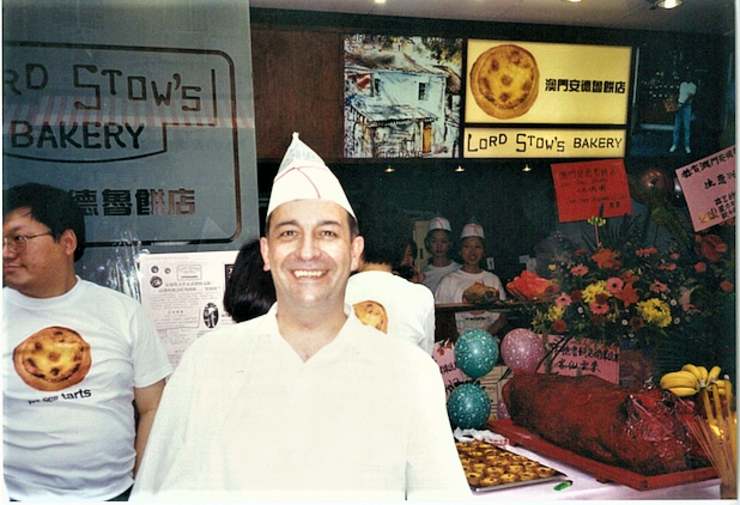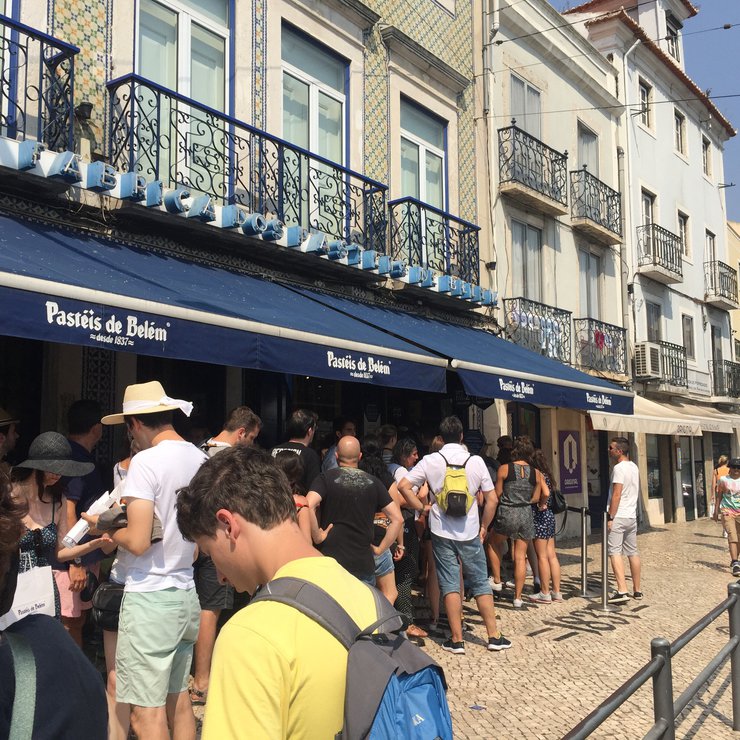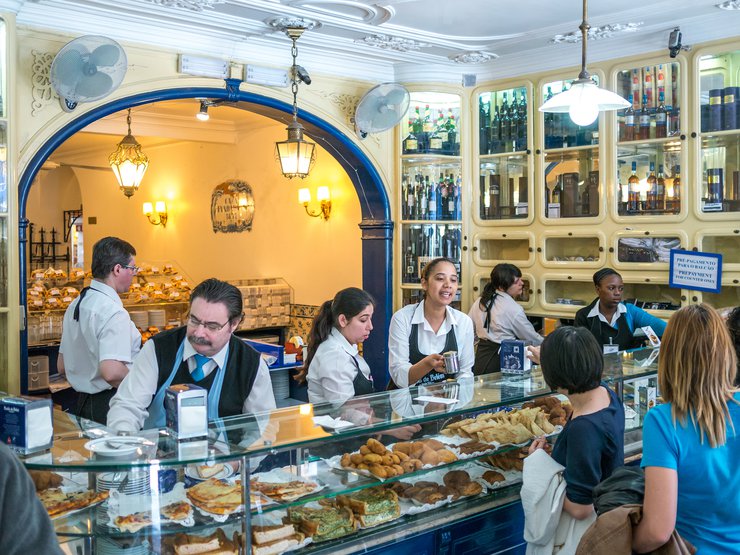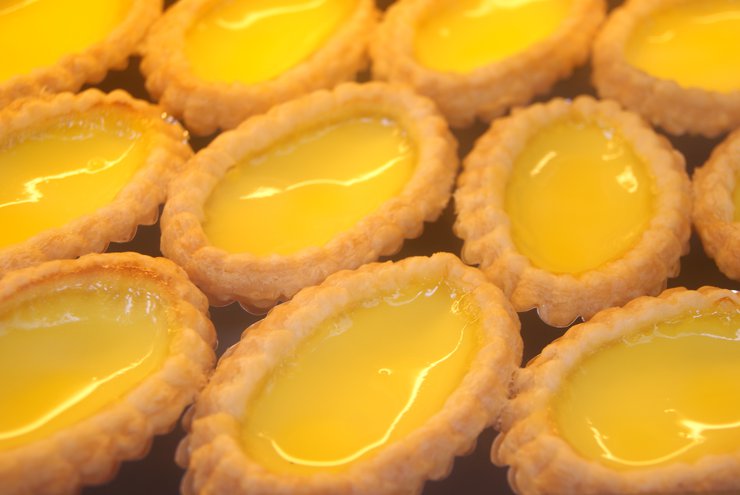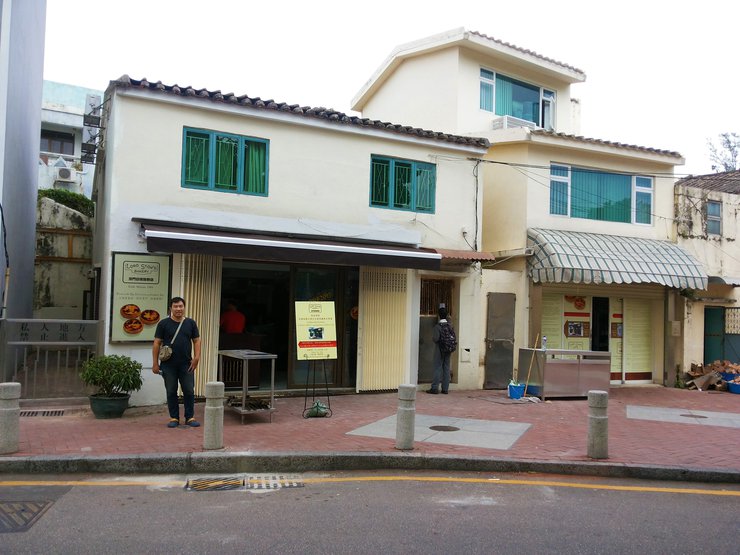The Tale of Macau Egg Tarts

Anyone who has the opportunity to visit Macau should not miss the chance to try the egg tarts, a local symbol that is famous worldwide.
Macanese egg tarts, while influenced by their Portuguese counterparts, are not identical. The first baker to sell egg tarts in Macau combined Portuguese and British recipes, creating a unique hybrid. In essence, Macanese egg tarts are a fusion of Portuguese and British culinary traditions.
The defining characteristics of Macau egg tarts are their flaky, puff pastry-like crusts and the deep brown caramelized surface of the custard filling. This crust resembles that of Portuguese tarts, while the custard itself is closer to the English style, with a rich, creamy texture but without the stickiness of Portuguese custard. Another key difference from the Portuguese original is the absence of cinnamon in Macau egg tarts, which are typically enjoyed plain or with a light dusting of powdered sugar.
Egg Tart from the Original Shop in Macau

Original Portuguese Egg Tarts

The origins of the egg tart can be traced back to the 18th century, when nuns at the Jerónimos Monastery in Belém, a suburb of Lisbon, Portugal, are believed to have invented it. The recipe for the egg tart, known as "pastéis de nata" in Portuguese, was later passed on to a nearby pastry shop, "Pastéis de Belém," which has been selling them since 1837. To this day, the shop has preserved the original "pastéis de nata" recipe, which has been kept secret for nearly 200 years.
Pastéis de Belém: The Original Portuguese Egg Tart Shop


It is said that Portuguese nuns were the masterminds behind the creation of many egg yolk-based pastries. This is because, in ancient times, egg yolks were often discarded after the egg whites were used to stiffen fabrics. As a result, the nuns sought ways to utilize the leftover egg yolks, leading to the invention of various delectable treats.
Jerónimos Monastery

Andrew Stow, a British pharmacist from Essex, is credited with inventing the Macau egg tart recipe. After graduating with a degree in pharmacy, Stow worked in the pharmaceutical industry for a time before moving to Macau in 1979 to work for a multinational pharmaceutical company. When the pharmaceutical company closed, Stow decided to stay in Macau and pursue other opportunities.
Andrew Stow, founder of Macau's first egg tart shop

Source: http://www.smartshanghai.com/articles/dining/eat-it-kfcs-egg-tarts
After establishing his own health food business with his girlfriend, Andrew faced limited success. His sister, Eileen, remarked, "It seems Andrew's ideas were 20 years ahead of their time." During this period, Andrew also worked as a manager at a Portuguese restaurant. His management skills led to the restaurant's popularity, earning him the nickname "Lord Stow" from his colleagues. This nickname likely stemmed from his British origin and his leadership role within the restaurant, as he was one of the few English individuals in Macau.
His nickname, bestowed upon him by his colleagues, proved to be quite fitting, as he adopted it as the name of his bakery when he opened it in 1989, a name that remains in use today. The timing of his bakery's opening was opportune, coinciding with a surge of Portuguese entrepreneurs entering the Macau market during the 1980s, fueled by the booming economy. While he initially targeted Western customers, it was the Chinese clientele who embraced his products with the most enthusiasm, with egg tarts emerging as the star attraction.
Prior to the introduction of Andrew's egg tarts in Macau, locals were familiar with Chinese egg tarts (Dan Tat) imported from Hong Kong, typically sold in pastry shops or dim sum restaurants. These tarts featured a shortcrust pastry shell, similar to English tarts, while the custard filling was pale yellow, glossy, and lacked the caramelized top resulting from low-temperature baking. Additionally, the custard was thinner. In contrast, Andrew's egg tarts were Portuguese-style, with a flaky puff pastry shell and a caramelized top. It has been suggested that Chinese egg tarts pair well with Chinese tea, while Portuguese egg tarts complement black coffee.
Chinese-style tarts

The first Lord Stow's Bakery was a small, two-story, cream-colored building with three shopfronts located on Coloane Island, about 20 kilometers from the peninsula. Several bus lines pass by the bakery. The original bakery is still open today, but when I visited, it was closed for renovations. Fortunately, there were two branches of the bakery in the same area, just a short walk away. One branch sold pastries for takeaway, while the other was a restaurant that served both sweet and savory dishes, as well as drinks. Since I was already there, I couldn't resist buying some egg tarts to try. I ended up buying two and a half pieces.
The first "Lord Stow" egg tart shop

Lord Stow's Egg Tarts

The inspiration for producing egg tarts for sale arose in the late 1980s when Andrew visited Belem, a suburb of Lisbon, Portugal, considered the birthplace of Portuguese egg tarts. After tasting the original egg tarts, he was captivated by their flavor and had the idea of selling egg tarts in Macau, where a significant number of overseas Portuguese resided.
The provided text is empty. Please provide the text you want me to translate.
Andrew faced a challenge in not knowing the authentic recipe for Portuguese egg tarts. However, he was not one to be easily defeated. He asked a friend to teach him how to make the pastry cups, and for the custard filling, he drew upon his knowledge of mixing medicines to create his own unique recipe. The result was a signature egg tart that became his own.
Andrew's younger sister, Eileen, describes his egg tarts as a "fusion of culture and imagination," highlighting one of his defining characteristics. She also shares that her brother has always been adventurous. As a young man, Andrew cycled across the country to Germany. He is an avid traveler and enjoys learning about other cultures. Eileen adds, "Andrew is like a 6-year-old trapped in an adult's body, which is why he's not afraid to transform familiar recipes into his own creations."
The Unexpected Rise of Egg Tarts: A Case Study in Entrepreneurial Success
Andrew's initial business plan focused on producing bread and pastries for supermarkets, with egg tarts as a secondary offering. In his loan application to the bank, bread was listed as the primary product, with egg tarts ranking fifth. He anticipated selling only 200 egg tarts per day. However, the reality has surpassed expectations, with daily sales reaching an astonishing 14,000 egg tarts.
In the initial stages of Lord Stow's introduction of egg tarts to the market, the response from customers, including the Portuguese, was lukewarm. This was because the new recipe differed from the traditional Portuguese recipe, and the people of Macau were hesitant to try it due to concerns about the health risks associated with the burnt custard. However, for Lord Stow, the burnt custard was the signature of his shop.
The Rise of Macau's Egg Tarts: A Culinary Journey
The story of Macau's iconic egg tarts began with a simple gesture of kindness. A Macau resident, upon visiting a relative in Hong Kong, brought along a box of egg tarts from the renowned Lord Stow's Bakery. This seemingly innocuous act sparked a culinary phenomenon.
Word of the delectable egg tarts spread quickly among Hong Kong tourists visiting Macau. They, in turn, began bringing boxes of these sweet treats back home, further igniting the popularity of Lord Stow's creations. The media took notice, featuring the bakery and its signature egg tarts in numerous articles and broadcasts. This widespread exposure propelled Lord Stow's into the limelight, securing its place as a must-visit destination on the Macau tourism map.
The journey of Macau's egg tarts exemplifies the power of word-of-mouth marketing and the ability of a single act of generosity to spark a culinary sensation. From a simple gesture to a global phenomenon, the story of these delectable pastries underscores the interconnectedness of food, culture, and human connection.
The growing popularity of egg tarts has led to a surge in the number of egg tart shops opening across Macau. However, Lord Stow's remains one of the most popular shops. Lord Stow's has expanded its franchise to neighboring countries since 1997, including Hong Kong, Taiwan, the Philippines, and Japan. In 2006, Andrew Stow was awarded the Special Medal for Services to Tourism by the Macau government.
Tragically, in the same year, Andrew passed away suddenly from asthma at the young age of 51. However, the legacy of his delicious egg tarts lived on, passed down to his sister and daughter, Eileen and Audrey Stow. Under their leadership, the business expanded to multiple branches.
Eileen, Andrew Stave's younger sister

Source: http://says.com/my/lifestyle/macao-s-portuguese-egg-tarts-are-to-die-for
After her divorce from Andrew, Margaret Wong opened her own bakery, "Margaret's Café e Nata," which became a popular destination for egg tarts.
Margaret's Café e Nata, owned by Andrew Stow's ex-wife.

Egg tarts are available on almost every street corner in Macau, especially in tourist areas such as the Ruins of St. Paul's and Taipa Village. Determining the best shop is subjective, as tastes vary. It's best to try different shops and decide for yourself.
Gift shops near the ruins of St. Paul's Church

To truly savor the deliciousness of egg tarts, it is highly recommended to consume them while they are still warm, freshly baked from the oven. This ensures a crispy crust and a smooth, melt-in-your-mouth custard filling. When you encounter such a treat, be prepared to devour every last piece!
*********
Note: Use copyright-free images.
ม่อน บางม้า
Wednesday, February 26, 2025 3:48 PM




